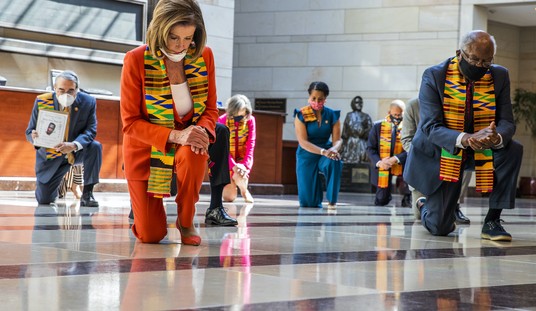The AG is Eric Schneiderman, a devoted Hillary Clinton supporter who’s also investigating Trump University for fraud but not investigating the Clinton Foundation for failing to disclose to New York State which foreign governments chipped in a cool $225 million to the organization between 2010 and 2014. Go figure that a comparatively penny-ante charity like Trump’s would be scrutinized by a Democratic hack for failing to comply with all legal niceties but not Hillary’s global pay-to-play scheme.
And yet, the fact remains that Trump’s charity does seem to have neglected to register to solicit funds, as WaPo’s David Fahrenthold detailed last week. Trump handed Schneiderman the club to beat him with and now, with just a month to go before the election, Schneiderman’s swinging.
The office of New York Attorney General Eric T. Schneiderman has issued a “notice of violation” to Donald J. Trump’s foundation, ordering it to immediately stop soliciting donations in New York…
In the letter, his office provided notice to Mr. Trump’s foundation that within 15 days it must provide certain documents required to be filed by organizations that solicit contributions, including audited financial statements and annual financial reports. It also must file any “delinquent reports” for past years within that time frame.
“The failure immediately to discontinue solicitation and to file information and reports” with the charities bureau, Mr. Sheehan said, “shall be deemed a fraud upon the people of the state of New York.”
You can read the cease-and-desist letter here, while the Trump Foundation’s filings with New York State are available at this database. As noted by Fahrenthold, the very top of the very first page of the New York CHAR500 form asks the organization to specify its “registration category.” The Trump Foundation checked “EPTL,” the law designed for simple family foundations. Larger charities that fundraise aggressively from the public are governed by a different law, Article 7-A. It used to be the case that the Trump Foundation operated as a family foundation, with Trump himself the group’s only donor, but it hasn’t been that way for 10 years. (In fact, Trump himself hasn’t donated a dollar since 2008.) There’s reason to believe that it’s been soliciting money from outside donors, which, if true, would make it a 7-A charity. And 7-A charities have a particular requirement under state law that they need to fulfill:
The annual financial report shall be accompanied by an annual financial statement which includes an independent certified public accountant’s audit report containing an opinion that the financial statements are presented fairly in all material respects and in conformity with generally accepted accounting principles, including compliance with all pronouncements of the financial accounting standards board and the American Institute of Certified Public Accountants that establish accounting principles relevant to not-for-profit organizations.
The state doesn’t worry much about family foundations since typically they’re only receiving money from one very rich benefactor who established the charity for his or her own use. It does worry about 7-A charities since they’re collecting money from the general public and the temptation to fleece people in the name of contributing to a good cause will prove too much for some grifters. That’s where the independent audit comes in. Why might the Trump Foundation want to avoid an audit? Fahrenthold had some theories about that:
In recent years, The Post has reported, Trump’s foundation does appear to have violated tax laws in several instances.
In 2013, it gave a donation to a political group supporting Florida Attorney General Pam Bondi (R) — despite a ban on nonprofit groups making political gifts. The Trump Foundation then filed an incorrect tax filing, which omitted any mention of that gift, and said incorrectly that the money had gone to a charity in Kansas. Trump paid a $2,500 penalty tax for that political gift this year.
In two other instances, Trump’s foundation has made payments which appeared to help settle legal disputes involving Trump’s for-profit businesses. In 2007, Trump’s foundation paid $100,000 to settle a lawsuit involving his Mar-a-Lago Club in Florida. And in 2012, the foundation paid $158,000 to the charity of a New York man named Martin Greenberg on the day that Greenberg settled a lawsuit against one of Trump’s golf courses.
Today’s letter from Schneiderman doesn’t suspend the charity entirely, but it does prevent the foundation from asking for donations — and since Trump himself isn’t donating anymore, that means the group is effectively without access to new funds until this is resolved. (Unless people start contributing unsolicited, of course.) The cease-and-desist letter gives the group 15 days to comply with the registration requirements, including the audit requirement, which seems impossible in such a short time frame. The foundation will ask for an extension, I assume. What does Schneiderman do then? The 15-day period will run out on October 18, just three weeks before Election Day. If the charity doesn’t have all of its paperwork ready by then, I wonder if he might hold a presser to announce that it hasn’t met the deadline despite its request for an extension and declare it a “fraud upon the people.” That’d be quire a headline for Trump when the media’s already in a feeding frenzy. Question for legal eagles in New York: Can the charity obtain an extension by right or is it in Schneiderman’s power to decline the request? He seems hacky enough to decline it just because it would make for a good news cycle for his friend Hillary.








Join the conversation as a VIP Member